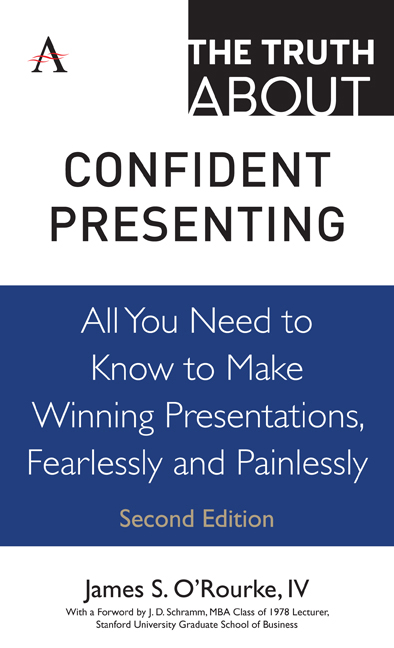 The Truth about Confident Presenting
The Truth about Confident Presenting Book contents
- Frontmatter
- Contents
- Foreword
- Introduction
- Part I Some Initial Truths
- Part II The Truth About Getting Ready to Speak
- Part III The Truth About What Makes People Listen
- Part IV The Truth About Developing Support for Your Presentation
- Part V The Truth About Getting Up to Speak
- Truth 25 Select a delivery approach
- Truth 26 Your introduction forms their first impression
- Truth 27 Begin with a purpose in mind
- Truth 28 Keep your audience interested
- Truth 29 Conclusions are as important as introductions
- Truth 30 Have confidence in your preparation
- Truth 31 Repeat the process as often as possible
- Part VI The Truth About Managing Anxiety
- Part VII The Truth About Nonverbal Communication
- Part VIII The Truth About Visual Aids
- Part IX The Truth About Handling an Audience
- Part X The Truth About What Makes a Presentation Work
- References
- Acknowledgments
- About the Author
Truth 27 - Begin with a purpose in mind
from Part V - The Truth About Getting Up to Speak
- Frontmatter
- Contents
- Foreword
- Introduction
- Part I Some Initial Truths
- Part II The Truth About Getting Ready to Speak
- Part III The Truth About What Makes People Listen
- Part IV The Truth About Developing Support for Your Presentation
- Part V The Truth About Getting Up to Speak
- Truth 25 Select a delivery approach
- Truth 26 Your introduction forms their first impression
- Truth 27 Begin with a purpose in mind
- Truth 28 Keep your audience interested
- Truth 29 Conclusions are as important as introductions
- Truth 30 Have confidence in your preparation
- Truth 31 Repeat the process as often as possible
- Part VI The Truth About Managing Anxiety
- Part VII The Truth About Nonverbal Communication
- Part VIII The Truth About Visual Aids
- Part IX The Truth About Handling an Audience
- Part X The Truth About What Makes a Presentation Work
- References
- Acknowledgments
- About the Author
Summary
Give some thought to how you'll begin your talk, because it may be among the most memorable aspects of the speech. The so-called primacy effect in psychology is a bias in the way people perceive and think about what they hear. Listeners are more likely to remember and believe what they hear first, rather than what they hear later on. This phenomenon is said to be due to the fact that short-term memory at the beginning of a sequence of events is far less “crowded” and, because there are fewer items being processed in the brain, there is more time for rehearsal, consolidation and storage of those events, which can later cause them to be transferred to long-term memory.
A good introduction takes advantage of the primacy effect by offering the most important and memorable aspects of the presentation in the first few minutes. The audience is eager to hear and think about your ideas. Don't disappoint them and don't waste time on issues that are unrelated to your reasons for speaking. So, how should you begin? Many proven methods are available to you as you begin a speech. You might consider these:
Begin with an anecdote. Tell a story. People have loved listening to stories since they were kids, waiting for bedtime. Ronald Reagan's success as a speaker, in part, was due to his ability to “spin a yarn.” Even those who disagreed with his politics acknowledged the importance storytelling played in his political life.
Try humor. People love to laugh, but be careful with this. Humor is great, unless you're not funny. Foremost among the occasions when you are likely not to be funny is when the joke is on the audience, or someone they hold in high regard. Spontaneous, contemporary humor tends to work best. Stay away from set-piece jokes and amusing stories you have heard recently.
Offer a prediction. Can you offer, based on the evidence you have gathered, a prediction that is likely to interest, amuse, frighten or arouse your audience? Make sure you can support your contentions. And, 27 make sure the evidence on which they are based is readily available and easily understood.
- Type
- Chapter
- Information
- The Truth about Confident PresentingAll You Need To Know To Make Winning Presentations, Fearlessly And Painlessly, pp. 107 - 110Publisher: Anthem PressPrint publication year: 2019


